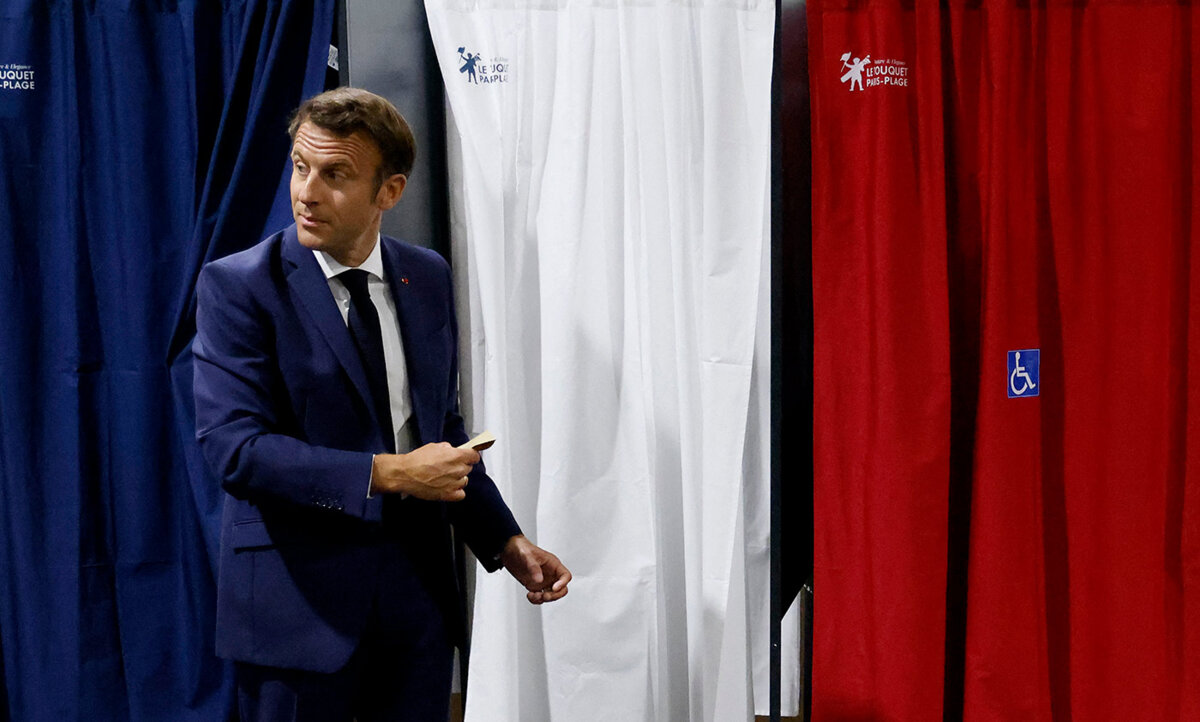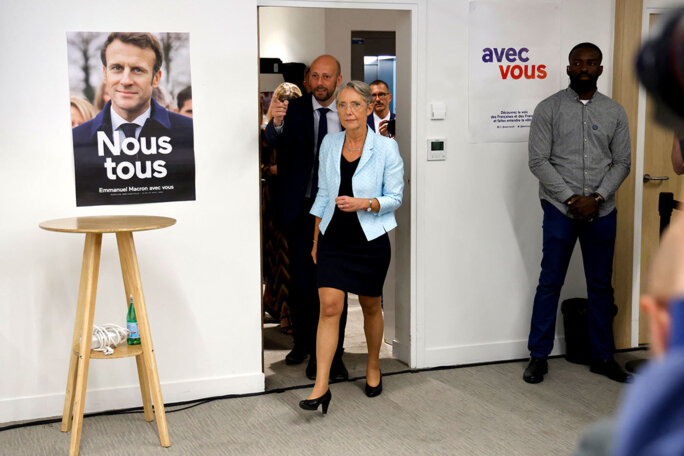Emmanuel Macron has failed in his gamble. His political movement attracted the lowest share of the vote in the first round of legislative elections for any president in the history of France's Fifth Republic. The president's Ensemble coalition won the support of 25.75% of the electorate in Sunday's first round, just a fraction ahead of the vote for candidates standing for the broad leftwing alliance NUPES (the Nouvelle Union Populaire Écologique et Sociale) who received the backing of 25.66% of voters. This was a clear rebuff by the electorate compared with the legislative elections in 2017 when the president's political camp won 32% of the vote share, far ahead of any rivals.
To state it more starkly: three-quarters of the French electorate who voted on Sunday did so for candidates other than those in the presidential coalition. Speaking on Sunday evening after the initial projections were published, prime minister Élisabeth Borne raised the risk of “political instability” in a bid to motivate Macron supporters to turn out for next Sunday's decisive second round vote. She also insisted that a NUPES victory on June 19th would be a “threat” to the “Republic's values”.

Enlargement : Illustration 1

“We're the only political force in a position to obtain a majority in the [National] Assembly,” said the prime minister. Macron loyalist and president of the National Assembly during the last Parliament, Richard Ferrand, who on the eve of the vote had boasted of the “common values” he shared with the head of the NUPES alliance Jean-Luc-Mélenchon, said on Sunday evening that the country was faced with a “choice between values”.
The first-round vote on Sunday June 12th confirmed what the legislative election campaign itself had suggested: that Emmanuel Macron's re-election as president against the far-right in April had not left him with any political momentum. Sure of his own power, the head of state chose to run a minimal campaign, waiting 26 days before naming a government that was stuffed full of loyalists and technocrats. He belatedly awoke to the risks and launched an attack on NUPES but this was not enough to dispel the campaign inertia that the Élysée long refused even to acknowledge.
The 2022 legislative elections have definitely not followed the same course as the 2017 vote. Back then the representatives of Macron's new movement – many of them complete unknowns - swept the board. But in Sunday's vote local factors once again seem to have developed greater importance, faced with the national issues at stake.
That is surely the explanation behind the relatively good performance of the rightwing Les Républicains (LR), who picked up 10.5% of the vote on Sunday despite a catastrophic presidential election in April in which their candidate Valérie Pécresse came fifth with just 4.8% of the vote. A section of the electorate on the traditional Right who had backed Emmanuel Macron at the presidential vote in April seems to have returned to the fold for the legislative vote.
On top of the resilience shown by its incumbent MPs, around 50 of whom are well-placed to keep their seat next Sunday, the LR may even pick up a few new constituencies, something that would have been considered highly unlikely just a few days ago. One striking example is in the Rhône département or county in the southeast, where the LR mayor of Rillieux-la-Pape, Alexandre Vincendet, came far ahead of the sitting MP Anissa Khedher from the ruling La République en Marche (LREM) party, which is part of the Ensemble coalition.
Government minister Amélie de Montchalin in trouble
The ruling majority coalition will also have been dismayed by the performance of several of its national figures in the first-round vote. Amélie de Montchalin, the minister for ecological transition and regional solidarity, is in trouble in her constituency in the Essonne département south of Paris. The former LR member is more than six points behind her socialist rival Jérôme Guedj, winning 31.5% of the votes against 38.3%. The former education minister Jean-Michel Blanquer, meanwhile, was eliminated in the first round of voting in the Loiret département in central France.
Other senior figures from Macron's movement came top in Sunday's first round but saw their vote plunge compared with 2017. That was the case with former interior minister Christophe Castaner, the current president of the LREM group at the National Assembly, who lost 14 percentage points (44% down to 30%) compared with 2017, and who was just 300 votes ahead of his leftwing rival Léo Walter. Five years ago there was a 5,000-vote gap between them in the first round. In the Seine-et-Marne département south-east of the capital, trade minister Franck Riester lost ten percentage points compared with 2017 and is just 1,500 votes ahead of his far-right rival.
Sunday did produce some satisfying outcomes for the ruling coalition. The public accounts minister and former government spokesperson Gabriel Attal came close to being elected in the first round in the Hauts-de-Seine département west of Paris with 48.1% of votes cast; under election rules a candidate must score over 50% of the vote and 25% of registered voters must have turned out in order for a candidate to get elected in the first round. Olivier Véran, the former health minister who is now in charge of government relations with Parliament, fared even better with 49.7% of the vote and should win at a canter in the second round. Other senior figures, including prime minister Élisabeth Borne and interior minister Gérald Darmanin, are in similar positions. Finally, the minister for solidarity, Damian Abad, was ten points clear of his leftwing rival, despite the allegations of rape against him, claims he denies.
The government is now looking to the second round on Sunday with some apprehension. While the prospect of an outright victory for the Left has faded, the possibility that the president's camp might lose no longer seems impossible. Looking at the voting patterns from the first round of voting and the head-to-head contests set up for next Sunday, there is no certainty that Ensemble will win overall control in the new Assembly. “These results make a majority uncertain,” conceded one minister on Sunday night.
Ruling majority play the 'Republican front' card
Emmanuel Macron's supporters now have their eyes firmly fixed on the threshold of 289 seats that is needed to secure an overall majority in the National Assembly. If the president's coalition fails to do so then the government will have to attract support from “compatible” MPs from the Socialist Party, the LR or the centre-right UDI. This would either be on a case-by-case basis according to the legislation proposed, or under a new Parliamentary pact that would have to be drawn up. This was the outcome that Élisabeth Borne was seeking to avoid on Sunday evening when she called on the French people to give her a “strong and clear majority”.

Enlargement : Illustration 3

One key issue causing divisions in the presidential camp last night was over what to urge its voters to do in those 58 constituencies where Ensemble has been eliminated and which will see a direct contest between candidates from NUPES and the far-right Rassemblement National next Sunday. In an initial statement to news agency AFP the LREM said that they would give no national guidance on how its supporters should vote in these duels between the Left and the far-right. The party said that each contest would be examined on a “case by case” basis. The party argued that there would indeed be a “Republican front” - an informal pact among mainstream parties to keep out the far-right – against “the extremes”. But the LREM indicated that it regarded “some NUPES candidates to be extreme”.
One senior figure from the LREM sought to distinguish between Jean-Luc Mélenchon's La France Insoumise (LFI), the leading party in the NUPES alliance, and the LFI's allies. The source said: “When you leave the Republican arena there's no more Republican Front.” Speaking on public broadcaster France 2, justice minister Éric Dupond-Moretti set out the Élysée's line. “You have to think about the difference between someone who belongs to the [traditional] Left of government and an outright Mélenchonite,” he said.
Others, such as Europe minister Clément Beaune – who is himself in difficulty against a NUPES candidate in his Paris constituency – have called for voters to back the candidate from the Left, as he explained to Mediapart before the presidential election. LREM's spokesperson Maud Bregeon, speaking to BFMTV news channel on Sunday, took a similar line. “I want to be extremely clear this evening. Not a single vote should go to Rassemblement National. We are calling across the board for far-right candidates to be beaten,” she said. This view was again echoed by the government's spokesperson Olivia Grégoire speaking on RTL radio on Monday morning when she said: “Let's be very clear. Not a single vote for Rassemblement National.” In view of the different approaches that have been advocated, the final decision on which line to follow on this sensitive and crucial issue will be made at the Élysée.
--------------------------------------------------------------------------
- The original French version of this article can be found here.
English version by Michael Streeter


